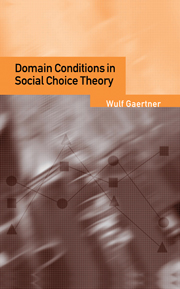Book contents
- Frontmatter
- Contents
- Preface and acknowledgements
- 1 Introduction
- 2 Notation, definitions and two fundamental theorems
- 3 The existence of collective choice rules under exclusion conditions for finite sets of discrete alternatives
- 4 Arrovian social welfare functions, nonmanipulable voting procedures and stable group decision functions
- 5 Restrictions on the distribution of individuals' preferences
- 6 The existence of social choice rules in n-dimensional continuous space
- 7 Concluding remarks
- References
- Author index
- Subject index
4 - Arrovian social welfare functions, nonmanipulable voting procedures and stable group decision functions
Published online by Cambridge University Press: 02 December 2009
- Frontmatter
- Contents
- Preface and acknowledgements
- 1 Introduction
- 2 Notation, definitions and two fundamental theorems
- 3 The existence of collective choice rules under exclusion conditions for finite sets of discrete alternatives
- 4 Arrovian social welfare functions, nonmanipulable voting procedures and stable group decision functions
- 5 Restrictions on the distribution of individuals' preferences
- 6 The existence of social choice rules in n-dimensional continuous space
- 7 Concluding remarks
- References
- Author index
- Subject index
Summary
Arrow's impossibility theorem states that there exist no nondictatorial social welfare functions when the set of individual orderings is unrestricted. Gibbard (1973) and Satterthwaite (1973, 1975) proved that if all logically possible individual preference orderings are admissible, the only nonmanipulable voting procedures are dictatorial ones. There have been two lines of investigation to resolve the difficulties posed by these impossibility results. Path 1 proposed to choose a particular aggregation mechanism (such as the majority rule or some extension of this method) and then to look for domain conditions such that possibility results are obtained. This is what we were discussing throughout chapter 3 with respect to social welfare functions and related collective choice rules. Path 2 which was initiated by Maskin (1975, 1976) and, independently, by Kalai and Muller (1977), reversed the procedure. In these investigations, domains of individual orderings are characterized which admit n-person nondictatorial social welfare functions and n-person nondictatorial nonmanipulable voting procedures. To this line of research we now turn. We shall also return to the method of majority decision and see that among all aggregation schemes that fulfil a certain set of properties, simple majority voting is the only rule that is transitive on the widest class of domains.
- Type
- Chapter
- Information
- Domain Conditions in Social Choice Theory , pp. 46 - 75Publisher: Cambridge University PressPrint publication year: 2001



